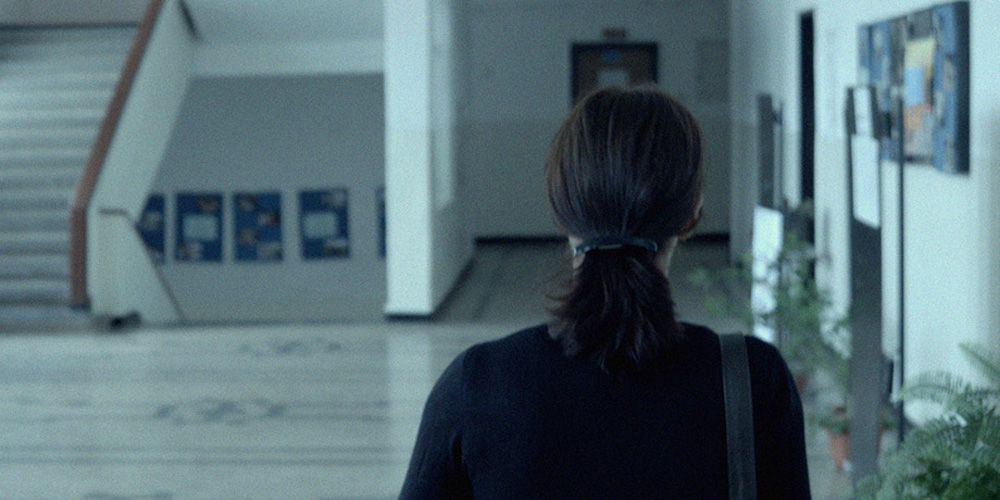“Don’t ruin yourself over something so insignificant,” Nadezhda (Margita Gosheva), the lead character of “The Lesson,” tells her husband early in the film, watching him toil over fixing up an RV to sell in their driveway. She has just returned home from her day job as a schoolteacher in rural Bulgaria where she has to supplement the English lessons she gives to a class of unruly pre-teens with an education in morals, collecting spare change from her entire class for a student who has had her lunch money stolen when no one is willing to come forward to claim responsibility.
That sense of fairness makes it all the more devastating when you discover Nadezhda barely has any money in her own name, which serves as the thrust of the taut and darkly funny debut feature from Kristina Grozeva and Petar Valchanov that reminds of classic morality tales such as “The Bicycle Thief” and more modern character studies with a thriller bent, such as “The Maid” and “A Teacher.” Told with unstinting confidence and control, “The Lesson” unfurls as Nadezhda is thrown for a loop when she learns her house is about to be foreclosed on through no fault of her own, sending her on a wild hunt for the money to keep it. Between a rich father she has all but disowned after he remarried to a much younger woman and a seedy loanshark she has done odd jobs for in the past, Nadezhda’s options for ponying up the cash may be worse than if her house was actually auctioned off, yet armed with a fierce turn from Gosheva, Grozeva and Valchanov are able to entertain even while creating a keen examination of a woman constantly making decisions to preserve what she can of what was once a strong belief system.
Shortly before the film makes its debut at the Toronto Film Festival, the two first-time directors spoke about the real-life incident that inspired the film, their plans for a trilogy and how they fashioned an opening scene that would set the tone for the rest of the production.
Kristina Grozeva: The film is based on a true story. Some years ago, a Bulgarian teacher robbed a bank and this event sunk deep in our minds. After our short “Jump, we made a TV movie, but we dreamt of making our [first] feature and we struggled to make it, but we are very happy that this story was our first big work.
Petar Valchanov: Yes, and our idea is that this film will be the first part of a trilogy — three stories, inspired by true events, but they’re not biographical stories. They’re just captured from the newspaper stories.
I’ve read the second film in this trilogy will revolve around a train worker who discovers some money on the tracks and tries to return it to its rightful owner, and your short film “Jump” was also about someone from humble origins who gets in over his head when he has to take care of his cousin’s expensive apartment. Is there something interesting to you about these characters who try to do the right thing in the face of their own economic issues?
PV: Yes, the interesting part is this story can happen to everyone. And the joke was it happened to a teacher. Here in Bulgaria and everywhere, this economic crisis has pressed many into a corner and they don’t have an option or a free choice. A wrong decision is in every direction.
KG: In fact, we were deeply interested by this situation of a teacher who robbed a bank because we discovered a deep contradiction. This is very shocking that a saintly person like a teacher can become a criminal, but in our times and the reality that we live in, this is absolutely possible.
The first scene of the film is a pretty brilliant set-up for the rest of it, where you can see Nadezhda collect money from her students to compensate for the money that’s been stolen from one of them, followed by the fact that she barely has money herself. Was that written after you had most of the story worked out?
KG: When we wrote the script, we had many ideas for the first opening scene and I don’t remember how exactly this scene came up. The plot of the [student] who robs [their] classmates was something we made up, but this was very important for us because it’s like a mirror — [the student] who is a little criminal and the teacher who found them out.
PV: And this scene was very difficult because it was the first scene [we shot] and it was very hard for the actress because she’s standing in front of these 30 kids. On a usual schedule, maybe it would be normal for this kind of scene to be in the middle of the shooting, but we were pressed for time and this was a microbudget production — the finance problem was with us in the production like our main character in the film. [laughs]
Was it a difficult film to edit? There’s a lot of tension, but not a whole lot of action.
PV: Yes, actually that first scene [is a good example] because there was a lot of material and it was difficult moving the character [through] the story. We did three different edits [of the film]. The first one was two hours and 20 minutes, then we cut around 40 minutes and then another five. We also had a lot of scenes which were only one take, which was difficult on the shooting period. It was also difficult because our idea was to not use music, so it was very difficult to build a sound.
With your background in documentary, was that an influence on the film’s realism?
PV: We did one documentary two years ago and we created fictional elements [for it] and we discovered that we love to make this combination between documentary and fiction. That’s [what inspired the] idea with the cast of [“The Lesson”] to maybe only use three or four professional actors and the other ones are not professional. The money lender [played by Stefan Denolyubov, who also starred in “Jump”] is professional, but the cop [who arrives to repossess Nadezhda’s home] is not, as well as many others. But the style of shooting in the school was very close to the documentary style of shooting, which is what made it difficult for our actress. [laughs]
 How did you become collaborators?
How did you become collaborators?
KG: While we were studying at the National Academy of Theatre and Film Arts in Sofia, we worked together and we realized that we are more confident and creative on set with one another.
PV: It’s easier with the responsibility [too] because when she directs, I say, “Okay, she’s taking the responsibility” and [vice versa] and it’s good because we’re more objective. For example, Kristina worked more with the script and after that, I had a more objective point of view. After the edit, which I worked more on, she carried this fresh point of view in and took it in a different angle, so it’s funny and for us, it’s very important to enjoy the work while we’re doing it.
You can tell. There’s a great underlying sense of humor in the film despite it telling a rather tragic story.
PV: Yes, this is very important point to us as directors and the stories that we want to tell. We want to tell dramatic stories, but with a bitter smile. For example, our previous short film “Jump” was more of a comedy, but with elements of drama and now it’s the opposite. But it’s very important to mix these genres because for us this mix of humor and drama make the story closer to real life.
“The Lesson” opens in New York at Film Forum on March 4th.





